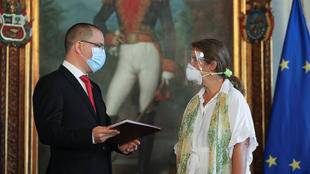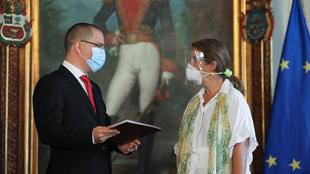Venezuela has announced that the EU ambassador in Caracas is unwelcome in the country.
On Wednesday, February 24, Venezuelan Foreign Minister Jorge Arreaza stated that the EU ambassador in Caracas has 72 hours to leave the country after the bloc imposed new sanctions on Venezuelan officials this week. Arreaza described the sanctions imposed by the EU on 19 Venezuelan officials as "completely unacceptable." He then declared that Isabel Brilhante, the Portuguese EU ambassador to Venezuela, is unwelcome in the country.
In response, the European Union demanded that the Venezuelan government "retract" its decision to expel its ambassador in Caracas. A spokesperson for EU Foreign Minister Josep Borrell stated, "We urge the authorities (in Venezuela) to reverse this decision, which will increase Venezuela's isolation."
On Monday, the EU announced sanctions against 19 officials in President Nicolas Maduro's regime in response to legislative elections won by allies of Maduro, which the opposition and many Western democracies claim were marred by fraud. With this decision, approved by the foreign ministers of EU member states, the total number of Venezuelan officials and senior government employees under EU sanctions rises to 55, including travel bans to EU countries and the freezing of their assets.
The EU imposed sanctions particularly on Omar José Prieto, Governor of Zulia State, and Armed Forces Commander Remigio Ceballos Ichaso, along with three officials from the electoral council, including its president Indira Maira Alfonso Izaguirre, as well as two deputies.
The Venezuelan foreign minister condemned these sanctions as "illegal." He added, "We hope that the EU will reconsider, and we hope to build bridges of understanding and dialogue, and we hope they learn to respect us." In Brussels, two EU diplomats stated on Wednesday that the expulsion of the EU ambassador in Caracas is an unwelcome step, but it will not change the bloc's efforts to mediate towards finding a way to hold new presidential elections.




